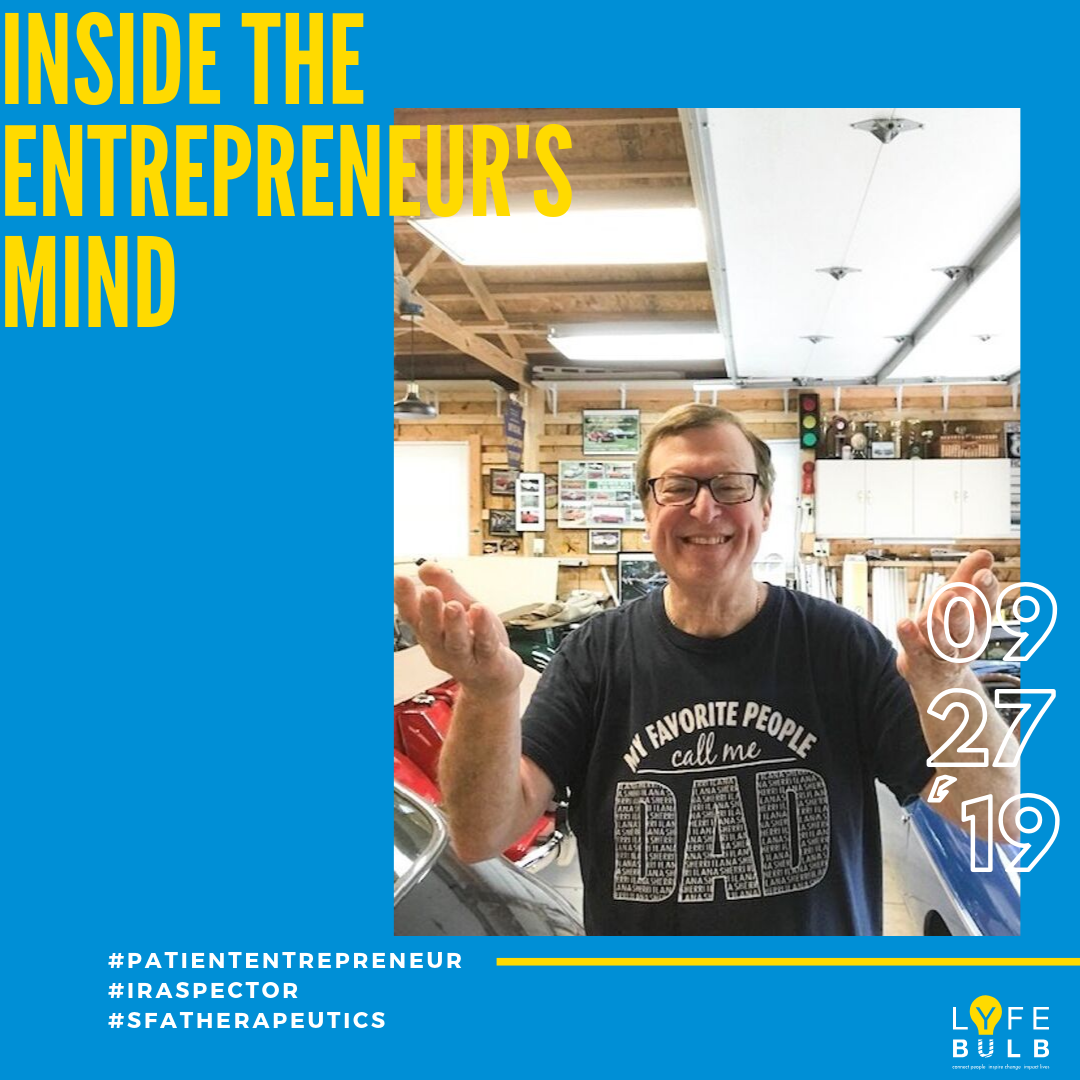Inside the Patient Entrepreneur’s Mind: Ira Spector, PhD

Managing a chronic illness is challenging, whether it is your own or a loved one’s. Starting and running a business also poses unique challenges. If you struggle with a chronic illness, have started a business, or want to start a business, this blog series can help guide you. “Inside the Patient Entrepreneur’s Mind” offers key insights into chronic disease and mission-driven entrepreneurship by some of the most innovative patient entrepreneurs in the world.
Ira Spector, PhD is CEO & Co-Founder of SFA Therapeutics. He is also a finalist of the 2019 Lyfebulb-Helsinn Innovation Summit & Award in cancer.
As a patient entrepreneur, can you describe your personal experience with cancer and how this experience drove you to innovate the space?
I had two parathyroid tumors removed in 2013 and I was very lucky that they were both caught early and localized. The only problem I had was a sequela of cancer treatment, because there is almost always other damage that occurs. For me, my body was overproducing calcium after cancer treatment so I have calcium deposits in all of my joints as well as my heart valve that required a lot of follow up cardiac care. In my case, I feel lucky that my tumors were caught early. Unfortunately, I have a lot of other personal connections to cancer and other illnesses that resulted differently than my case. My mother and father both had cancer, we lost my father-in-law to colon cancer and my brother-in-law to what we think was glioblastoma. I was also heavily influenced growing up with a seriously ill sibling in terms of guiding me to do what I do now. I’m fairly unique because I am in the drug development industry. In terms of cancer, specifically, when I found the technology that was the basis for SFA, it was supposed to start as an anti-inflammatory platform. Almost by happenstance, after looking at the pathways downregulated by this anti-inflammatory platform, I found them to also be oncogenes. When I discovered the downregulating effect of this anti-inflammatory platform on certain oncogenes, I learned that there were other cancers with an inflammatory component that we could go after with this therapy.
What makes SFA Therapeutics unique and how does it meet an unmet need of the cancer community?
Cancer patients live the rest of their lives looking over their shoulder waiting for the cancer to come back—we think our drugs are the metaphorical umbrella to prevent recurrence. Other than addressing environmental factors like smoking, cancer prevention doesn’t get a lot of attention on the Big Pharma or development side. What we’re saying is wait a second, there are millions of people who have already been treated and now they are just living in fear—what about them! We think we have an approach to reach this community of people. With the exception of certain type of breast cancer, there are very few cancers where other drugs are used to prevent relapse recurrence. At least in terms of CLL and ALL, the path to reduce recurrence comes from this drug we are developing at SFA. We think there is a whole generation of drugs that are very safe and non-chemotoxic to help prevent relapse.
Traditional treatment of cancer has been based on the theory that cancer cells grow more rapidly than normal cells. Agents like chemotherapy or radiation have been used to kill those cells, while also killing healthy cells in the process, to reduce the cancer burden. Our thesis differs in that we believe certain cancers have an inflammatory component and there is a way to control that inflammatory response in the cell. Our drugs are designed to prevent recurrence of tumors by reducing chronic inflammation.
Are there any other unmet needs of the cancer community that you think take priority in working to address? How are patient entrepreneurs well-suited to meet these needs?
Cancer is all too often treated with the ‘let’s just get it out’ mentality and we need a more integrative approach involving the family and disease experience. There are others working on this too, and although we have to be focused with resources, we recognize that there clearly needs to be an integrated approach that improves cancer aftercare. Although we are focused on drug development at SFA, we as Patient Entrepreneurs recognize the general needs of the community are huge. There is a lot of stigma and psychology that could be addressed here. I have a tremendous sensitivity to the broader issues here and I recognize that is also not a very well met need societally.
Where do you draw your inspiration and motivation from to keep forging ahead as an entrepreneur in the healthcare industry?
Patients. I’m an industry veteran involved in household name drugs. That being said, I get up every morning thinking about patients who haven’t been treated and patients who could’ve been treated by drugs that failed. The inspiration comes from the fact that we are not done and there is still a lot left to do. I know that has become my mantra now in the industry, but it has always been my driver. Getting out of the lab or business setting and going out into the field to talk to physicians, patients, and families—that’s why we are here. Almost everyone who gets into this have personal connections—both of my co-founders have personal connections. It’s just that simple. Pharma and biotech are rated the lowest of the low in public opinion polls, even though most of us who work in this industry are trying to change the world. Despite making a fair amount of progress, we are all vilified based on perceptions about things like costs and the opioid epidemic. We just soldier on regardless of the public opinion in the hopes of changing public understanding of how hard we work to help patients.
Lastly, what do you do for fun to manage the stress of running a business as both a cancer survivor and an entrepreneur? Do you have any similar advice on work-life-disease management balance to others out there thinking of starting a business to meet an unmet need of a chronic disease patient community?
There are two activities that I engage in. In the summer, we move to the beach so I average 3-4 miles per day walking on the beach. I’m also an active swimmer. However, my other big passion is restoring antique cars. The goal isn’t to finish, but to just decouple by putting on the stereo (I’ve worked on a car for 5 years). On a bad day, if I can’t get anything done on a car because of the calcium deposits in my hands, I walk away and do something else like walk or swim. My advice to other budding patient entrepreneurs is that you need to have activities that totally decouple from what you’re doing and enable you to have a recreation that clears your mind. Do something completely different in order to unplug. You just need to have something, whether it’s music or sports, to decouple from the stress of the day.

